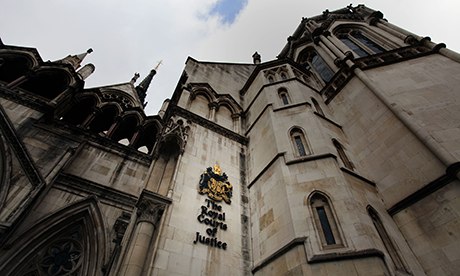Dwaine George's case is the first to be referred by students from a university-based Innocence Project

The Criminal Cases
Review Commission referred the case of Dwaine George to the court of
appeal on Friday Photograph: Graham Turner
The Criminal Cases Review Commission (CCRC) referred the case
of Dwaine George to the court of appeal on Friday. Daniel Dale died
almost instantly as he ran away from a shooting in the Miles Platting
area of Manchester in July 2001. George, then 18 years old, was
sentenced to life in prison for the murder after a jury at Preston Crown
Court found him guilty. He pleaded not guilty.
A few weeks ago George, now 29, was released from prison on life licence, having studied hard and been awarded a first class social sciences degree. "I have said from day one that it wasn't me. I know there are still huge hurdles ahead, but I want to prove my innocence," George says.
The notable feature of the referral is that it's the first time a case has been referred to the court of appeal on application made by a university-based Innocence Project. The first Innocence Project was started in the UK in 2005 and there are now some 27 projects based at universities in England and Wales.
George had appealed against his conviction in 2004 but the appeal was dismissed. The new referral is based on evidence relating to gunshot residue identified by students at Cardiff University Law School. The CCRC commissioned an expert analysis of the residue and the referral draws on the report. Cardiff University Law School Innocence Project has made "a very significant contribution to the case and to the referral of Mr George's convictions", the CCRC says.
George's case was one of six cases that students at Cardiff Law School investigated, overseen by its director Julie Price and consultant Dr Dennis Eady. "We worked on it for almost four years, then it was with the CCRC for a further three", writes Price. She adds that it is a time for "reflection rather than celebration."
"A young person was killed. That victim's family saw someone convicted and they are now faced with the news that the conviction is under the spotlight 12 years after the event. A wrongful conviction will mean that the real perpetrator may still be walking our streets."
Times moves at a glacial pace in the under-resourced and overly-complex world of criminal appeals, nonetheless it is a shock to learn that this is the first case to be referred through an application signed off by a university. There was the Simon Hall referral – although the work was largely done by Bristol University, the application was apparently made in the name of the solicitors' firm who advised them previously. And, of course, Hall confessed. That bombshell over the summer stunned many campaigners who viewed Hall as a flagship case for the movement and the first real prospect of getting a conviction overturned.
It led to some internal reflection within the university community – not least by Price who has been candid about her frustrations with the lack of progress in her Diary of an Innocence Project column. "I don't think that university innocence projects have even scratched the surface of the miscarriage of justice problem. Although they have played an important part in teaching our future lawyers about the iniquities of the criminal justice system," Price tells me. No one would doubt the commitment and energy of students working hard to investigate cases of those alleging to be victims of miscarriages who would otherwise have nowhere to turn. As David Robinson, legal advisor at the CCRC, reflected this month at the Innocence Network UK (INUK) conference, some 27 projects are investigating around 100 cases and "presumably dozens more" for those innocence projects who operate outside of INUK. The Cardiff project is not part of INUK.
But Robinson went on to reflect on "the mismatch" between the number of cases being investigated and the number of applications to the CCRC.
Since 2005, there has only been applications relating to 17 individual cases from a total five universities. There isn't much love lost between INUK and the CCRC. The conference was the first time the Commission had been invited since 2008 and INUK's founder Michael Naughton has consistently made the argument that the watchdog is no longer fit for purpose. Many of the concerns about the cash-strapped and overwhelmed CCRC are well-made, some aren't.
No doubt with that history in mind, David Robinson offered the INUK students "some sort of context" for their figures. Since 2005, 266 CCRC referrals have gone back to the courts – almost exactly half of the total number of cases referred by the Commission. "How many meritorious cases might there be out there in the hands of innocence projects and how many more referrals might we have been able to make if we had seen more applications from them?" Robinson asked the INUK delegates.
Price hopes that referral of George's case "will give a welcome boost to the morale of UK Innocence Projects at this time of crossroads and brick walls". One hopes so.
A few weeks ago George, now 29, was released from prison on life licence, having studied hard and been awarded a first class social sciences degree. "I have said from day one that it wasn't me. I know there are still huge hurdles ahead, but I want to prove my innocence," George says.
The notable feature of the referral is that it's the first time a case has been referred to the court of appeal on application made by a university-based Innocence Project. The first Innocence Project was started in the UK in 2005 and there are now some 27 projects based at universities in England and Wales.
George had appealed against his conviction in 2004 but the appeal was dismissed. The new referral is based on evidence relating to gunshot residue identified by students at Cardiff University Law School. The CCRC commissioned an expert analysis of the residue and the referral draws on the report. Cardiff University Law School Innocence Project has made "a very significant contribution to the case and to the referral of Mr George's convictions", the CCRC says.
George's case was one of six cases that students at Cardiff Law School investigated, overseen by its director Julie Price and consultant Dr Dennis Eady. "We worked on it for almost four years, then it was with the CCRC for a further three", writes Price. She adds that it is a time for "reflection rather than celebration."
"A young person was killed. That victim's family saw someone convicted and they are now faced with the news that the conviction is under the spotlight 12 years after the event. A wrongful conviction will mean that the real perpetrator may still be walking our streets."
Times moves at a glacial pace in the under-resourced and overly-complex world of criminal appeals, nonetheless it is a shock to learn that this is the first case to be referred through an application signed off by a university. There was the Simon Hall referral – although the work was largely done by Bristol University, the application was apparently made in the name of the solicitors' firm who advised them previously. And, of course, Hall confessed. That bombshell over the summer stunned many campaigners who viewed Hall as a flagship case for the movement and the first real prospect of getting a conviction overturned.
It led to some internal reflection within the university community – not least by Price who has been candid about her frustrations with the lack of progress in her Diary of an Innocence Project column. "I don't think that university innocence projects have even scratched the surface of the miscarriage of justice problem. Although they have played an important part in teaching our future lawyers about the iniquities of the criminal justice system," Price tells me. No one would doubt the commitment and energy of students working hard to investigate cases of those alleging to be victims of miscarriages who would otherwise have nowhere to turn. As David Robinson, legal advisor at the CCRC, reflected this month at the Innocence Network UK (INUK) conference, some 27 projects are investigating around 100 cases and "presumably dozens more" for those innocence projects who operate outside of INUK. The Cardiff project is not part of INUK.
But Robinson went on to reflect on "the mismatch" between the number of cases being investigated and the number of applications to the CCRC.
Since 2005, there has only been applications relating to 17 individual cases from a total five universities. There isn't much love lost between INUK and the CCRC. The conference was the first time the Commission had been invited since 2008 and INUK's founder Michael Naughton has consistently made the argument that the watchdog is no longer fit for purpose. Many of the concerns about the cash-strapped and overwhelmed CCRC are well-made, some aren't.
No doubt with that history in mind, David Robinson offered the INUK students "some sort of context" for their figures. Since 2005, 266 CCRC referrals have gone back to the courts – almost exactly half of the total number of cases referred by the Commission. "How many meritorious cases might there be out there in the hands of innocence projects and how many more referrals might we have been able to make if we had seen more applications from them?" Robinson asked the INUK delegates.
Price hopes that referral of George's case "will give a welcome boost to the morale of UK Innocence Projects at this time of crossroads and brick walls". One hopes so.


